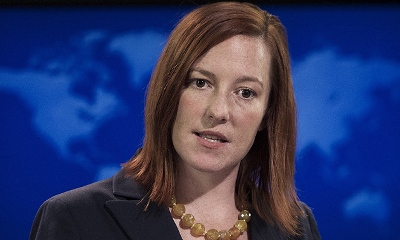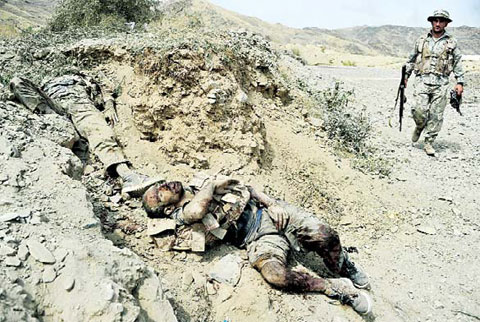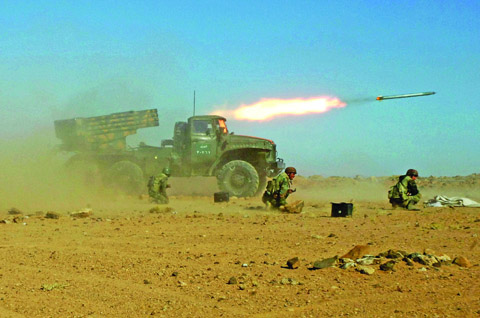World News


WASHINGTON: In his weekly address on Saturday, US President Barack Obama urged Congress to support a limited and targeted military action against the Syrian government for its alleged use of chemical weapons.
“I call on members of Congress, from both (Republican and Democratic) parties, to come together and stand up for the kind of world we want to live in; the kind of world we want to leave our children and future generations,” he said.
Mr Obama returned to Washington on Friday night after discussing Syria with Russian President Vladimir Putin and other world leaders at the Group of 20 summit in St. Petersburg, Russia.
The US media noted that Mr Obama failed to persuade other leaders to support his decision for launching limited military strikes on Syria.
The media speculated that the failure will make it even harder for Mr Obama to persuade sceptical American legislators and public to support his decision.
Earlier, the White House released a joint statement–by leaders of Australia, Canada, France, Italy, Japan, Republic of Korea, Saudi Arabia, Spain, Turkey, the United Kingdom and the United States—condemning the Aug. 21 chemical weapons attack in rebel-held suburbs of Damascus.
But the statement, signed at the summit, did not have what the US wanted: an endorsement of President Obama’s call for a military strike.
Instead, it merely said that “we call for a strong international response to this grave violation of the world’s rules and conscience that will send a clear message that this kind of atrocity can never be repeated.”
President Obama is not getting much support at home either for his military option. Recent opinion surveys show that an overwhelming majority of Americans opposes the military option.
In his weekly address, Mr Obama also acknowledged that the American people were weary after a decade of war, which is why US action would not include US boots on the ground.
He pointed out that his proposed authorisation focused on clearly stated objectives–preventing and deterring the use and proliferation of chemical weapons within, to, or from Syria, degrading the Assad regime’s capacity to carry out future CW attacks, and deterring this behaviour in others who would otherwise feel emboldened to use such weapons.
Mr Obama argued that the attack on a civilian population in Syria was also a serious threat to America’s national security. “Not only because they cause death and destruction in the most indiscriminate and inhumane way possible – but because they can also fall into the hands of terrorist groups who wish to do us harm,” he said.
Addressing his nation from the White House last week, Mr Obama had announced that he had decided to take military action against the Syrian government.
“This is not a decision I made lightly. Deciding to use military force is the most solemn decision we can make as a nation,” he said on Saturday.
Mr Obama reminded his nation that instead of launching the attacks, he referred the matter to Congress because “I also know that our country will be stronger if we act together, and our actions will be more effective.”
He assured his nation that he did not want an open-ended intervention in Syria.
“This would not be another Iraq or Afghanistan. There would be no American boots on the ground. Any action we take would be limited, both in time and scope–designed to deter the Syrian government from gassing its own people again and degrade its ability to do so,” he said.
Mr Obama urged the American people to support his decision because “we are the United States of America. We cannot turn a blind eye to images like the ones we’ve seen out of Syria.”
Failing to respond to this “outrageous attack”, he warned would “send a horrible signal to other nations that there would be no consequences for their use of these weapons. All of which would pose a serious threat to our national security.”

WASHINGTON: Pakistan has a professional and dedicated security force that fully understands the importance of nuclear security, says the US State Department.
In a statement issued on Wednesday evening, the department’s spokesperson Jen Psaki also welcomed Pakistan’s reiteration of its commitment to disarmament and non-proliferation.
“We welcome Pakistan’s statement yesterday that it is fully committed to the objectives of disarmament and non-proliferation,” Ms Psaki said.
The United States is confident that the government of Pakistan is well aware of its responsibilities and has secured its nuclear arsenal accordingly.
While stating that “there is room for improvement in the security of any country’s nuclear programmes”, the State Department official noted that “Pakistan has a professional and dedicated security force that fully understands the importance of nuclear security”.
A spokesman for the Pakistan Foreign Office had assured the international community that the country had a robust control system for its nuclear weapons and also had taken extensive protection measures for ensuring their security.
Spokesman Aizaz Chaudhry also reminded the world that Pakistan’s nuclear programme was aimed at maintaining stability in South Asia.
The Pakistani official was commenting on a US media report which claimed that the Obama administration was extremely worried about the safety of the country’s nuclear weapons.
A day after Pakistan rejected the claims as incorrect; the State Department also issued a statement, backing Islamabad. “We recognise that Pakistan is fully engaged with the international community on nuclear safety and security issues, and is working hard to ensure its strategic export controls are in line with international standards,” Ms Psaki said.
“Pakistan is a state party to both Chemical Weapons Convention and Biological Weapons Convention and is a partner in the Global Initiative to Combat Nuclear Terrorism.”
The US official said that Washington and Islamabad regularly held talks on issues of shared interest including Afghan stability and would continue to work together towards more stability and security in Pakistan and the region.
“We have regular discussions with the government of Pakistan on a range of issues of important shared interests, including nuclear security, counter-terrorism and fostering a stable Afghanistan. We will continue to work together to find ways to cooperate to make Pakistan and the region more secure, stable and prosperous,” she said.

JALALABAD: Taleban suicide bombers and gunmen dressed as Afghan police attacked a US base near the Pakistani border yesterday, sparking a shootout that left all three assailants dead, officials said. No member of the US-led NATO mission in Afghanistan was killed in the assault on the base in Nangarhar province, said a spokesman for the International Security Assistance Force (ISAF). “There were a series of explosions that occurred in the vicinity of a forward operating base in Nangarhar province,” an ISAF spokesman told AFP.
The military later described it as an “attempted but unsuccessful coordinated attack by enemy forces”. “There were three enemy forces killed during the attack. We can confirm that no ISAF personnel were killed as a result of this incident,” it said in a statement. An AFP photographer saw the bodies of three dead attackers wearing Afghan police uniforms. NATO combat troops are gradually withdrawing from Afghanistan and are due to finish their mission completely by the end of 2014, after presidential elections next April. Afghan officials said yesterday’s attack took place at Torkham, which borders Pakistan and straddles a key NATO overland supply route into landlocked Afghanistan from the nearest sea port of Karachi.
Ahmad Zia Abdulzai, Nangarhar governor’s spokesman, said insurgents first attacked NATO supply trucks. “Today morning, Taliban insurgents attacked and burned supply trucks delivering supplies to NATO which belonged to foreign forces near the US base in Torkham,” he told AFP. “Later, three armed suicide bombers started gunfire and clashes with Afghan forces and US forces, and they were killed after three hours of fighting. “At the moment, the stand-off is over, and the situation is under control.” Zabihullah Mujahid, a spokesman for the Taliban which is leading a 12-year insurgency against Western troops and the Afghan government, claimed responsibility for the attack in a statement sent to the media.
The Taleban have launched a spate of attacks across the country in recent days, with scores killed in suicide bombings, ambushes and rocket attacks. They also killed five aid workers in the west. On Sunday the bullet-riddled bodies of seven civilians kidnapped one week earlier by the Taliban were found in Ghazni province just south of the capital. Also on Sunday Afghanistan’s ambassador to Pakistan and potential candidate for next year’s presidential election, Omar Daudzai, was appointed acting interior minister.
President Hamid Karzai, who has led Afghanistan since the 2001 US-led invasion removed the Taleban from power, is barred from standing for a third term. He has said he will not back anyone in the April 5 vote, but Daudzai is seen as one of his closest associates and loyalists. Daudzai, 55, from the biggest ethnic group the Pashtuns, was a member of the Hezb-e-Islami faction during the Soviet occupation and later went on to work for the United Nations. Interior minister Mujtaba Patang was voted out by parliament in July over accusations that he had failed to thwart the threat from Taleban rebels. Afghanistan’s 350,000-strong security forces are suffering a steep rise in attacks as the NATO mission winds down, with police and army casualties said to have increased by 15-20 percent since 2011.
The election to succeed Karzai is seen as the key test of whether 12 years of massive international military and aid intervention has been worthwhile. Karzai recently named controversial former warlord Abdul Rab Rasul Sayyaf, 2009 runnerup Abdullah Abdullah and former finance minister Ashraf Ghani as possible candidates. Other possibilities include Qayum Karzai, the president’s brother, and former interior minister Ali Ahmad Jalali. Karzai has pledged to ensure a smooth election, but international donors have expressed concern about whether the vote will produce a credible result after the 2009 poll was marred by massive fraud. —AFP

MOSCOW: Russia is sending a reconnaissance ship to the eastern Mediterranean, Interfax news agency reported yesterday as the United States prepares for a possible military strike in Syria. US President Barack Obama has said he will seek congressional authorization for punitive action against Syrian President Bashar al-Assad after what Washington said was a sarin gas attack that killed over 1,400 people. Russia is a staunch backer of Assad in his war with rebels trying to topple him. The reconnaissance ship left Russia’s naval base in the Ukrainian Black Sea port of Sevastopol late on Sunday on a mission “to gather current information in the area of the escalating conflict”, the Interfax report quoted an unidentified military source as saying.
The Defense Ministry declined immediate comment but Interfax said the vessel, the SSV-201 Priazovye, would operate separately from a Russian navy unit already stationed in the Mediterranean. Russian lawmakers want to travel to Washington to urge the US Congress not to back President Barack Obama’s plan for military strikes on Syria, the speaker of the upper house of parliament told President Vladimir Putin yesterday. Dismissing US accusations that the Syrian government had killed hundreds of its own people with poison gas as nothing but “talk”, senior legislator Valentina Matviyenko said both chambers were ready to send delegations.
Russia is one of the main allies of Syrian President Bashar al-Assad and has already blocked several Western-led resolutions in the UN Security Council to sanction him over his crackdown on a now 2-1/2-year-old uprising. Last week, the ministry said new warships were being sent to the Mediterranean but described this as a routine rotation of ships under a permanent deployment which Moscow says is needed to protect national security interests. Foreign Minister Sergei Lavrov also said at the time that Moscow did not intend to be dragged into any military conflict over Syria. Russia reiterated yesterday that the United States had not proved its allegations and that the chemical attack may have been staged by Syrian rebels to provoke outside intervention in the more than two-year-old civil war.
Lavrov said Russia remained unconvinced following a meeting between Michael McFaul, the US ambassador to Moscow, and a senior Russian diplomat. The material the United States has shown Russia “contained nothing concrete: no geographical coordinates, no names, no proof that samples were taken in a professional manner”, Lavrov told students and staff at Russia’s main diplomatic academy. “What our American colleagues and the British and French showed us earlier and recently absolutely does not convince us,” Lavrov said, according to state-run news agency RIA. Echoing comments by Putin at the weekend, Lavrov said: “There are no facts there … and when we ask for more detailed proof. They say, ‘You know, it’s all secret, so we cannot show it’. That means there are no such facts.” Russia is one of Assad’s biggest arms suppliers and has a naval maintenance facility in the Syrian port of Tartous. Moscow opposes any military intervention in Syria and has shielded Damascus from pressure at the UN Security Council. Lavrov defended decisions by Russia and China to block three Western-backed UN Security Council resolutions to press Assad to end the bloodshed, saying Moscow and Beijing “act on principle on all issues, including the Syrian crisis”. Russia and China “oppose attempts to return to the language of ultimatums,” he said. —Reuters

WASHINGTON: President Barack Obama yesterday backed away from an imminent military strike against Syria to seek the approval of the US Congress, in a decision that likely delays US action for at least 10 days. Obama, in a statement from the White House Rose Garden, said he had authorized the use of military force to punish Syria for a chemical weapons attack Aug 21 that US officials say killed 1,429 people.
Military assets to carry out a strike are in place and ready to move on his order, he said. But in an acknowledgement of protests from US lawmakers and concerns from war-weary Americans, Obama added an important caveat: he wants Congress to approve. Congress is currently in recess and not scheduled to return to work until Sept 9. “Today I’m asking Congress to send a message to the world that we are ready to move as one nation,” Obama said.
Obama’s decision was a big gamble that he can gain approval from Congress in order to launch a limited strike against Syria to safeguard an international ban on chemical weapons usage, guard US national security interests and protect regional allies like Turkey, Jordan and Israel. “I have long believed that our power is rooted not just in our military might, but in our example as a government of the people, by the people, and for the people,” Obama said.
His decision was also a significant shift away from what was perceived to be a strike fairly soon against Syrian targets. He had been prepared to act unilaterally after the British parliament refused to go along with American plans. Protracted and expensive wars in Afghanistan and Iraq have left Americans reluctant to get involved in Middle Eastern conflicts.
Most Americans do not want the United States to intervene in Syria. A Reuters/Ipsos poll taken this week showed only 20 percent believe the United States should take action, but that was up from 9 percent last week. A debate has raged for days in Washington among members of the US Congress over whether, or how quickly, Obama should take action.
Senate Republican leader Mitch McConnell backed the move, which he said Obama had told him about. “The president’s role as commander in chief is always strengthened when he enjoys the expressed support of the Congress,” said McConnell. Obama’s decision was announced after he met his national security team at the White House. Top aides were to brief senators later in the day and members of the House of Representatives are to receive a classified briefing from administration officials on Sunday.
The objective is to show solid proof that US intelligence officials say shows conclusively that the Syrian government of President Bashar Al-Assad launched a large chemical weapons assault in Damascus suburbs that left among the dead 426 children. Obama has broad legal powers to take military action, and he insisted he felt he had the authority to launch a strike on his own. But he said he wanted Congress to have its say.
Meanwhile, UN experts investigating a poison gas attack in Syria left the country yesterday, paving the way for the United States to lead military strikes to punish President Bashar Al-Assad. US President Barack Obama said the United States, which has five cruise-missile equipped destroyers in the region, was planning “limited, narrow” military action to punish Assad for an attack that Washington said killed 1,429 people.
“We cannot accept a world where women and children and innocent civilians are gassed on a terrible scale,” Obama said on Friday after Washington unveiled an intelligence assessment concluding Assad’s forces were to blame for the attack. The Aug 21 attack – the deadliest single incident of the Syrian civil war and the world’s worst use of chemical arms since Iraq’s Saddam Hussein gassed thousands of Kurds in 1988 – has galvanized a reluctant Washington to use force after two and a half years on the sidelines.
The team of UN experts drove up to Beirut International Airport yesterday after crossing the land border into Lebanon by road earlier in the day. No Western intervention had been expected as long as they were still on the ground in Syria. The 20-member team had arrived in Damascus three days before the Aug 21 attack to investigate earlier accusations.
After days holed up in a hotel, they visited the sites several times, taking blood and tissue samples from victims in rebel-held suburbs of Damascus and from soldiers at a government hospital. Other UN agencies have also pulled staff from Syria, and countries have warned citizens away from neighboring Lebanon. “Most of the mid-level and non-essential staff left on Thursday. The heads of the various agencies have stayed behind, together with a skeleton local staff,” a UN source said from Damascus yesterday. – Agencies

CAIRO: Workers in blue overalls clamber over scaffolding around Rabaa Al-Adawiya mosque, whitewashing its charred walls to restore a semblance of normalcy to the corner of Cairo where the struggle for Egypt reached a bloody climax this month. After a stunning reversal in which the army seized upon a tide of public discontent to overthrow freely elected President Mohamed Morsi, the powerful state apparatus appears to have all but neutralized the Muslim Brotherhood to which he belongs. Not only that.
Even as the army-backed government promises to shepherd Egypt towards democracy, its plans for a new political transition speak of a deep entrenchment of the old order that ran Egypt under veteran autocrat Hosni Mubarak. In the space of a few weeks, security forces have arrested the Brotherhood’s leaders and killed its supporters by the hundreds in the streets.
Meanwhile, a committee appointed without debate has proposed constitutional amendments that would open the way for a political comeback by Mubarak-era officials. The prospect of financial meltdown has been staved off by billions of dollars in aid from Gulf states hostile to the Brotherhood, and Western censure has been muted, at best. In a highly symbolic victory for the old guard, the 85-year-old Mubarak was himself released from jail last week, albeit to await a retrial for ordering the killing of protesters in 2011.
Keen to show support for the army, Egyptians who may once have displayed pictures of Mubarak now celebrate Egypt’s new top soldier, Abdel Fattah Al-Sisi, a hero to those who rallied against Brotherhood rule. One Sisi fan in Cairo is reportedly selling chocolate treats bearing the general’s image. And in language that would have been unthinkable only a few weeks ago, a state-run magazine this week described the 2011 uprising that toppled Mubarak as a “setback”.
WEEK OF BLOODSHED
With a nightly curfew enforced by the army, Cairo seems eerily calm. It is hard to believe Egypt has just suffered the bloodiest week in the Arab republic’s history. More than 900 people were killed, including some 100 police and soldiers, after security forces on Aug 14 destroyed the protest camps set up by Morsi’s backers after he was toppled.
The state had labeled the sit-ins a “threat to national security”. Accusing the Brotherhood of turning to violence – a charge the Brotherhood rejects as a pretext for the crackdown – the government has declared a “war on terrorism”. Fear has sucked the momentum from anti-government protests, and the arrests of Morsi and the other leaders have muted the Brotherhood’s voice. Essam El-Erian and Mohamed El-Beltagi, lawmakers even under Mubarak, have been reduced to issuing video messages from hiding.
Ahmed Mefreh of the international rights group Alkarama Foundation said more than 2,000 Morsi supporters had been arrested in Cairo alone. “The Brotherhood were losers in an impossible confrontation,” said Hassan Nafaa, a professor of political science at Cairo University and veteran political activist. The first draft of the new constitution seeks to restore the voting system that kept Mubarak in power for 30 years, something that has disappointed smaller parties that have struggled to establish themselves since the end of his one-man rule.
It would also lift a ban on former members of his government seeking office, and remove controversial Islamist-inspired language brought in last year. The government has begun to revive the political security apparatus that was shelved, but not dismantled, after the 2011 revolt. It has appointed ex-military figures to positions which, like the presidency, were once dominated by them. It seems unlikely the next president will be a rival to the power of the old establishment. The oath of allegiance sworn by conscripts no longer mentions loyalty to the head of state.
“What you will see is a very diminished role for the presidency – except of course if a military or security figure decides to run for that position,” said Nathan Brown, a leading expert on Egypt at George Washington University. He also noted that in contrast to other countries, where the army might pledge loyalty to the constitution and laws, in Egypt, soldiers and officers will not swear allegiance to “any civilian official, law or procedure”.
MILITARY PRESIDENT?
Exhausted by 2-1/2 years of turmoil, many Egyptians now believe only the army can restore stability, and the military, which suffered a public backlash after taking power in 2011, has proved more adept this time at marshalling support. Even though he has indicated he doesn’t want the job, the 58-year-old Sisi looks an obvious candidate for president.
Speculation that he will run has intensified since a first photo emerged last week of the general in civilian clothes. “General Sisi is a popular hero par excellence, and if he decides to enter the elections he is the most popular at the moment,” said Hamdeen Sabahi, a leftist who came a close third in last year’s presidential election and backed Morsi’s removal. Sabahi believes Sisi will stick by his word not to run.
Nevertheless, state TV aired a show on Wednesday discussing the merits of a president from the military, in which the guest said there was nothing wrong with having a general at the helm. As yet, nobody has declared their candidacy – in contrast to the frenzied campaigning before the vote won by Morsi last year with the help of the Brotherhood’s unrivalled political machine. Asked about his own aspirations, Sabahi told Al-Masry Al-Youm newspaper he had yet to decide: “Now is a moment that requires national ranks to unite in the face of terrorism.”
State media now describe the Muslim Brotherhood in terms akin to Al-Qaeda. The “war on terrorism” that the government has announced has already seen two of its top leaders put on trial on charges of inciting murder, by a court they say is political. Pro-Brotherhood protests, though still continuing, have shrunk dramatically, stifled in part by a state of emergency. “I do not go out in any protests where there is danger,” said one 26-year-old Brotherhood activist in the Mediterranean city of Alexandria who asked not to be named. “We’ve been demonstrating for two months and achieved nothing.”
BROTHERHOOD IN HIDING
Speaking by phone from hiding, Brotherhood politician Farid Ismail said opposition to the “putschist regime” was large and growing. “They want to make it seem that matters are proceeding through fait accompli politics,” he said. “They will not win. This is not victory.” But the group has few tools at its disposal to press the demand to which it still clings in public: a solution based on the constitution that was endorsed by a referendum last year.
“They now understand that they have lost and are under pressure from a wave of repression and arrests,” said a Western diplomat. “So they are in a second phase of saying they won’t return to any political process unless the repression stops and there are releases.” Though experts on the Brotherhood dismiss the idea it would be directly involved in violence, some have voiced fears that grievances could fuel a new wave of attacks by Islamist militants, reminiscent of the campaign of the 1990s and 1980s. – Reuters

TAIPEI: Police in Taiwan arrested 45 suspects in the island’s biggest ever crackdown on child pornography, officials said yesterday.
The clampdown last week targeted more than 50 locations as part of efforts to break up an international child pornography ring, in an operation codenamed “Angel Action”, the Criminal Investigation Bureau said.
All the suspects were released after initial interrogation but would face further questioning by prosecutors, Yang Yuan-ming, deputy commissioner of the bureau, told reporters. Anyone found guilty of distributing child pornography in Taiwan faces up to three years in jail and a fine of up to Tw$5 million ($165,000).
The Taiwan chapter of End Child Prostitution, Child Pornography & Trafficking of Children for Sexual Purposes (ECPAT) hailed the operation as “a big success”.
The crackdown came after ECPAT Taiwan last year tipped off US authorities about two pornographic websites set up in the United States. The websites have carried child pornography since 2007, with each attracting at least one million paid members, Lee Li-feng, secretary-general of ECPAT Taiwan, said.—AFP


